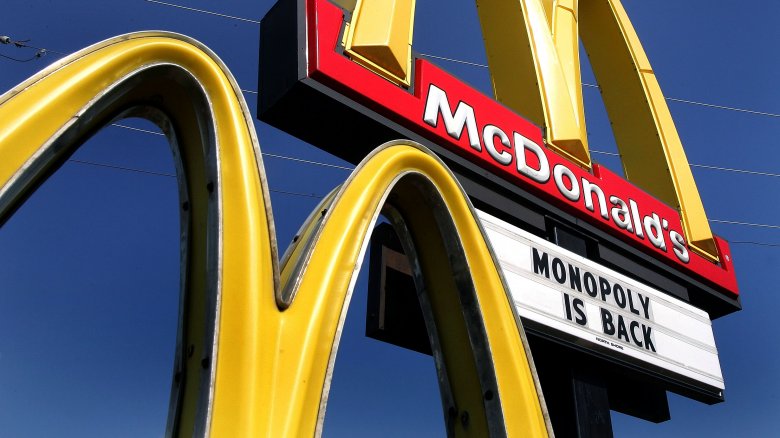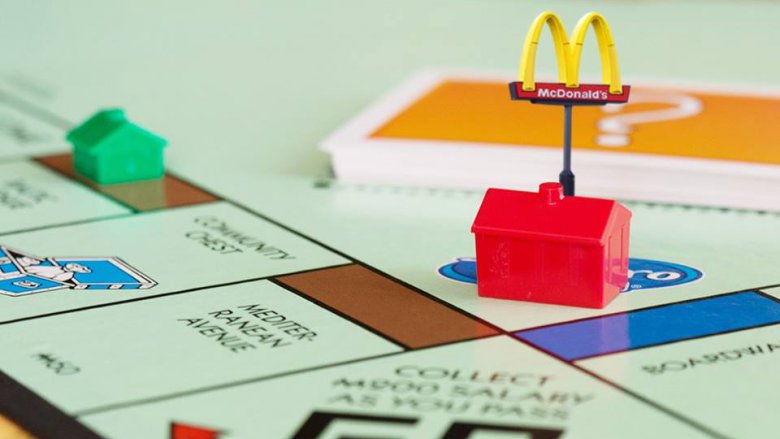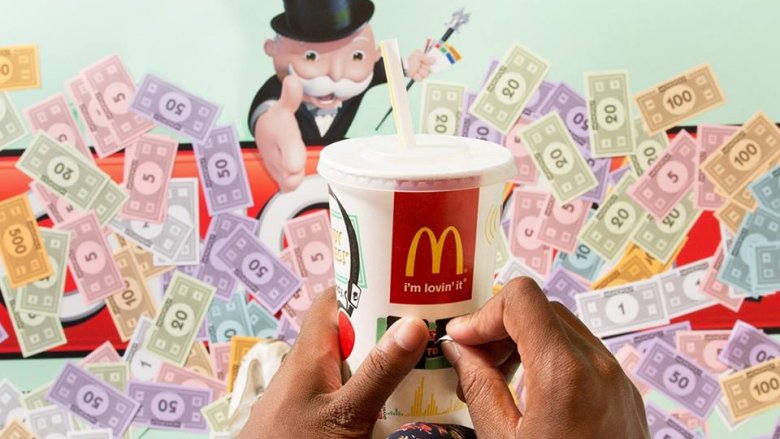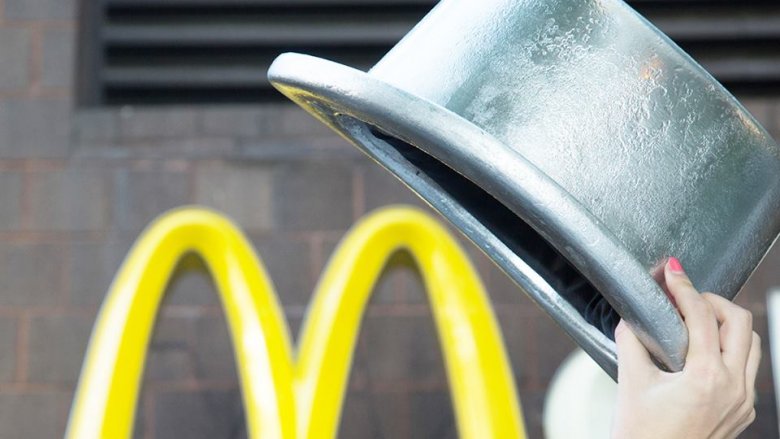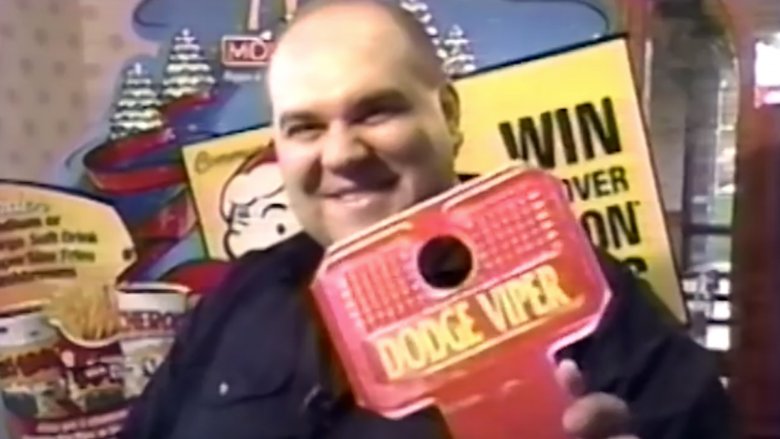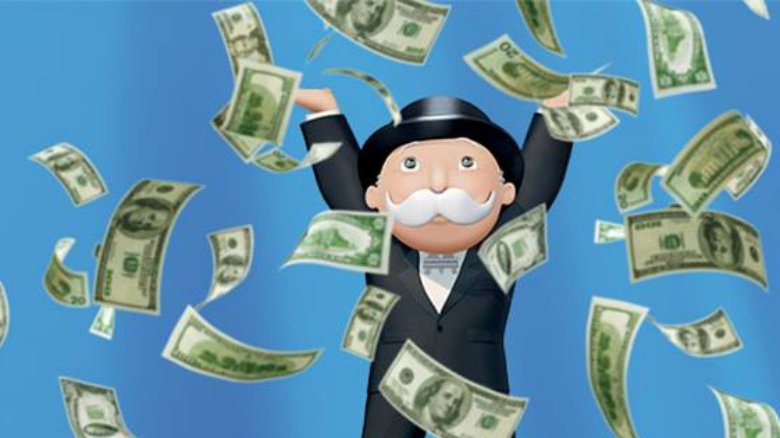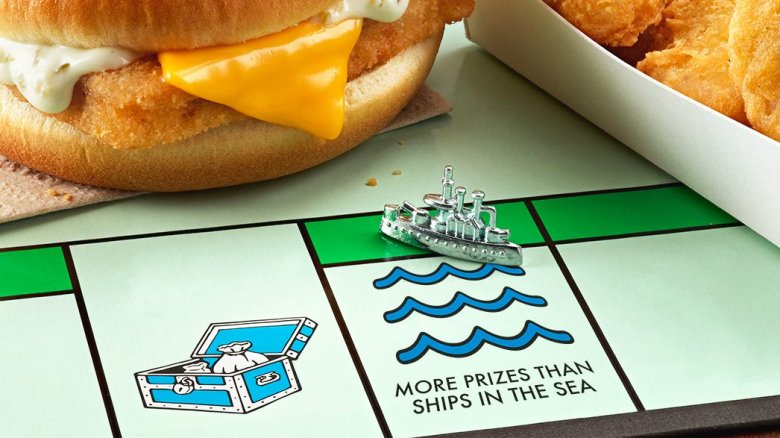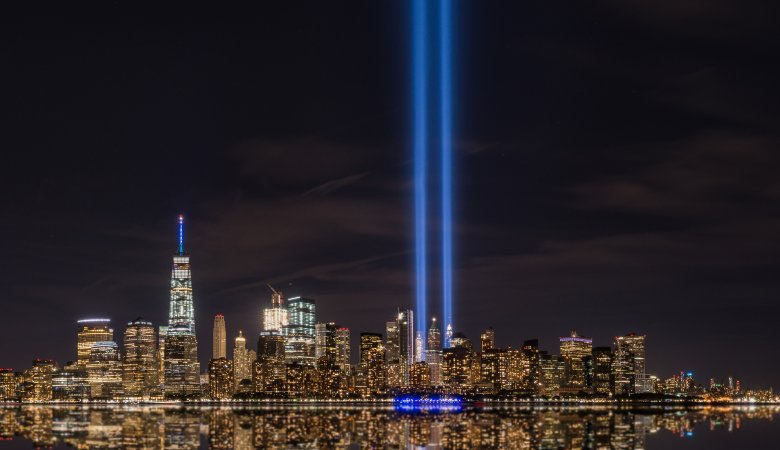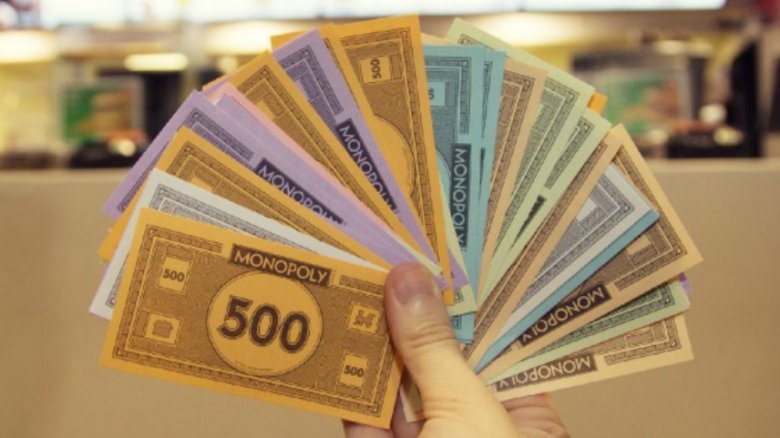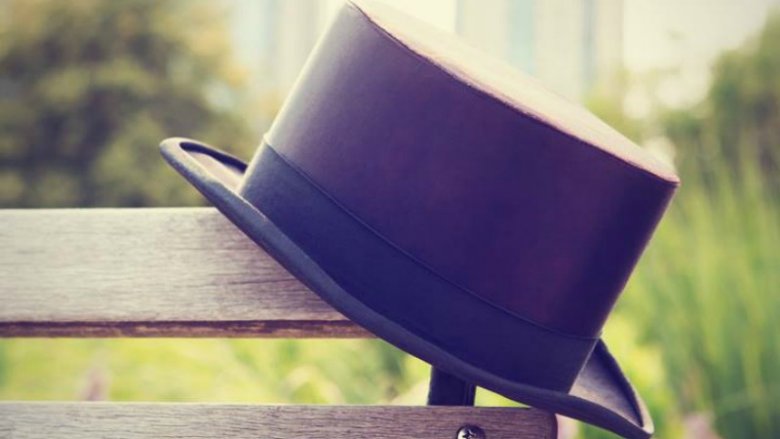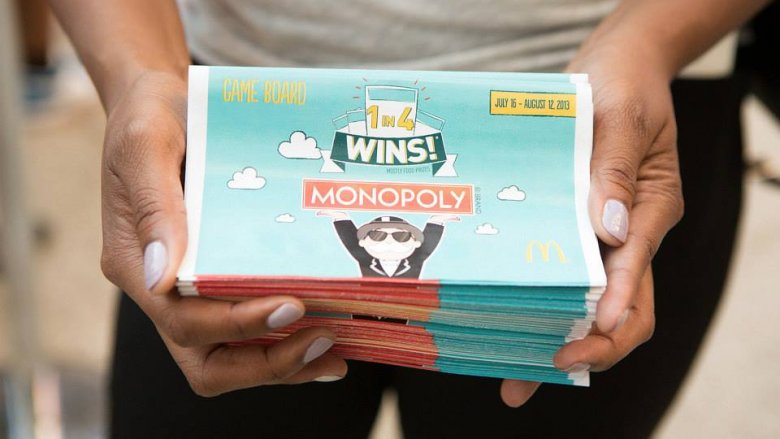How An Ex-Cop Rigged McDonald's Monopoly
McDonald's Monopoly got a small start in 1987 and quickly took the world by storm. That first year, the game boasted $40 million in prizes and it continued to grow as people got more excited by the game. For once, there was indeed truth in advertising — people flocked to the Golden Arches for a chance to win fabulous prizes via food purchases (after all, what's better than a real reason to enjoy a fast food lunch?), so McDonald's kept the contest coming back. It's not an exaggeration to say that either you or someone you know has had the entire board filled — except for the winning pieces. Where were they?
Well... turns out all those super-sized orders to maximize your Monopoly piece earnings was for naught. Despite what seemed like an iron clad system to keep the game legit, it was fixed more than a North Korean election. No matter how steep the advertised odds seemed, they were actually worse. The true odds on some prizes were 25,000 to zero — one man controlled all the winning pieces, and in an elaborate (yet sloppy) system he dolled out winning game pieces like they were Monopoly money.
It started with a cop, down on his luck
The Daily Beast explained the story in detail in July 2018, and there are so many twists and turns it'll leave your head spinning for days. It starts with Jerry Jacobson, who always wanted to become a police officer, and eventually he did. Unfortunately, a fluke injury and rare medical disorder cut his policing career short. After relocating from Florida to Georgia, he eventually landed a job doing security at Simon Marketing — he was so great at his job that Simon Marketing hired him directly and put him in charge of security overseeing one of their best clients, McDonald's, and their contest game pieces.
Jacobson had authority over all the pieces, and personally oversaw their distribution — right down to physically cutting the biggest winning pieces from their press roll, putting them in sealed envelopes, and distributing them himself. Jacobson made good money, but was always looking for a way to come across a quick buck. He tried to get his friends and co-workers to "invest" with him, saying he needed 10 people in order to rake in the riches. If that sounds like a pyramid scheme that's because it is. But rather than wait for 10 suckers to throw in some cash, Jacobson decided to do it the easy way — just steal the winning pieces.
He wanted to see if he could do it
Jacobson couldn't very well just take a winning game piece and act like he pulled off winning a McDonald's prize himself — this was 1989 but the 80s weren't that backwards. Instead, Jacobson took a $25,000 winning prize piece and gave it to his step-brother Marvin Braun in Florida. Why, you ask? According to the Daily Beast, Jacobson later told the police it was simply, "to see if I could do it." Despite the family connection, no one at McDonald's put two and two together and that winning piece was cashed with no questions asked.
Jacobson later justified this action (and the rest of his scam) by something he witnessed in 1995, allegedly. He claims he witnessed a random draw select a Canadian distribution facility to dole out prizes, only to have his bosses redo the random draw until they landed on an American spot. In Jacobson's mind that justified his actions, because if Canada's going to get hosed, everyone in North America should (or something like that). He even took documents to prove the conspiracy against the land of Anne Murray and Nickelback. Maybe he forgot about the fact that he gave a winning game piece to his step-brother six years earlier when he was making excuses.
At least he gave some to charity...
In late 1995, Tammie Murphy did her usual job of opening the donations letters sent to the Dallas St. Jude Children's Research Hospital, sorting through the junk mail for legit donations. She almost tossed what she thought was junk mail in the trash when something caught her eye — the words "Instant Winner." Someone had sent the hospital a $1 million McDonald's Monopoly game piece.
The incident made national news, and the timing for McDonald's couldn't have been better, the postmark revealed a date of November 24 — the day after Thanksgiving and the day after the Monopoly game began. That meant that they got this publicity right as the contest started. Who could possibly be so kind-hearted to make such a donation? Calm down, it was actually Jacobson himself. Despite (spoiler alert) this thing blowing up in his face, St. Jude did indeed keep the money. The Golden Arches couldn't bring themselves to pry the money away from the charity.
And then he met the mob
Jacobson did a good enough job dispersing tickets for a bit — his butcher acted as a middleman in some contests, with Jacobson getting his kickback of cash for handing out the winners. In 1995, the butcher promised a prize to his sister, but kept it for himself and claimed the prize. Jacobson knew the proximity wouldn't look good, so he decided to look for a new facilitator. By pure luck, he met that person by chance at an airport.
Gennaro (Jerry) Colombo, a Sicilian by birth who acted every bit like a mob character from a movie, flashed a bag of money to Jacobson and bragged of his gambling prowess and his famous crime family. Jacobson responded with the 1995 equivalent of "hold my beer" and bragged about how he controlled all the winning prizes for every contest anyone cared about. And with that, Colombo was in — he even "won" a Dodge Viper that same year and modestly appeared in a national commercial promoting winners.
Uncle Jerry made a name for himself
Unfortunately for Jacobson, Jerry Colombo wasn't using mob connections to sell the winning game pieces — he incorporated his wife Robin (introducing Jacobson as "Uncle Jerry") and used her family and friends as winners, with every "winner" giving Uncle Jerry a piece of their prize. Her father William Fisher traveled to New Hampshire from his Jacksonville, Florida home to "win" $1 million in 1996.
The year 1997 saw Robin's friend Gloria Brown claim a $1 million grand prize — which she happened to find on a box of fries while she was cleaning out her car, in Hilton Head. Brown gave a quote to a reporter, saying, "I never dreamed in a million years this could happen to me." If by "this" she meant that someone would give her a winning ticket on the condition that half the money was kicked back to them, then yes, that quote is 100 percent accurate.
Everything falls apart
Things really changed in 1998 when Jerry Colombo passed away. Jacobson eventually partnered up with Noah D. "Dwight" Baker and his wife Linda Baker — Dwight was a Mormon real estate developer who sold Jacobson two plots of land. The Bakers had big dreams that weren't panning out, and, according to the Atlanta Journal and Constitution (via Mormons Today) were deep in debt. The allure of the contest won them over, and they help Jacobson find at least four more "winners" for his scam.
Before long, someone on the inside let the Jacksonville FBI office know that a certain "Uncle Jerry" had access to McDonald's most desired game pieces and the entire contest was a lark. The FBI started poking around, and suddenly, everything unraveled.
Uncle Jerry's jig was up; the FBI figured out that Jacobson and Uncle Jerry were one in the same, and they set up a series of sting operations to close the net. The task involved convincing McDonald's CEO Jack Greenberg to run the contest again. Based on information gathered through phone taps and other surveillance, the FBI intercepted information containing the name of the next $1 million winner. When McDonald's informed them on July 30, 2001 that someone claimed the prize, the FBI already knew the winner would be John Davis, from Granbury, Texas. They had their man.
Why don't you remember this?
A logical question to ask now is, "Why are you telling me this now? Why didn't you tell me this in 2001?" That's a fair question.
The FBI posed as a camera crew and conducted a series of "fake interviews" to take down scam participants — under the guise that they were creating promo videos for McDonald's. They did a fake interview with Michael Hoover (a lucky winner recruited by one of Jacobson's pals) on August 3, 2001 and listened to his very detailed story of how he "won." On August 21, the FBI arrested eight conspirators, including ring leader "Uncle Jerry" Jacobson, and scheduled a hearing. By the time the national news got a hold of the story, the indictment number increased to 21 people and grew to include several other games of chance through McDonald's, with a total of more $13 million in prizes illegally won. The court case began on September 10, 2001. The next day was 9-11. The world changed, and stealing Boardwalk didn't seem very newsworthy anymore.
McDonald's had some making up to do
Nobody took this worse than McDonald's. Despite it being out of their hands, the Golden Arches knew they needed a mea culpa, and quick. Jacobson got 37 months in prison for his crime, but McDonald's paid the most for the scam — literally.
In an effort to make it up to the customers who had been duped into a playing an unwinnable game, they gave out $10 million in prizes to 55 random customers soon after the scam came to light. Unfortunately, some customers didn't feel that was enough, and McDonald's was hit with a lawsuit from two customers who argued that the random giveaway had benefited the restaurant the chain most of all.
As a result, Mickey D's gave out even more money in 2004 with almost no promotion at all. Over the course of just a few days, McDonald's reps gave away another $15 million to random customers who just happened to be in the right place, at the right time, through their Instant Prize Giveaway. Erika Mendez simply went to McDonald's to get two cheeseburgers, no onions and walked out with $1 million. And just like that, McDonald's considered themselves square for the great Monopoly scam.
They got sued for the winnings
A funny thing happened on the way to the trial. Stanley Warwick "won" a $1 million prize in 1999's Monopoly contest. He then assigned the prize to his wife Naomi — $50,000 a year for 20 years. The 2001 indictment named him as a co-conspirator, but he died in 2003 and he was never convicted of any crime. Still McDonald's stopped making payments after the third payout, once the scam had been revealed. Naomi filed a lawsuit against McDonald's for more than $2 million in 2005 — $1.3 million of that was for punitive damages and legal fees, and $850,000 to cover the "winnings" she had not yet received.
There's not much available information on how that case turned out — or if it even made it to court. It should be noted, however, that her lawyer, the late John C. Ambrose, does not list the case on his greatest hits of victories... so there's that.
Who was the rat?
There really isn't a lot left to the great McDonald's Monopoly scam to uncover, except the thing that brought down the whole scheme: Who ratted out Jacobson? Robin Colombo believes her in-laws were behind the tip — after her husband's passing she claims that they never forgave her for the accident (she was driving) and that was simply payback. That makes a good story, but Jacobson's conglomerate grew so wide that it could've been anyone who tipped off the FBI. And there certainly were a lot of clues pointing to an insider.
The FBI received a rather nonspecific tip — it simply said all the prizes were going to a small group of people. That led to the discovery of "Uncle Jerry," which led to Jacobson. In the end the tip didn't really matter; by 2000 the prize distribution was so sloppy it was just a matter of time before they all went directly to jail.
People really do win... now
McDonald's brought the Monopoly game back in in 2003 after a short break — and customers were probably pretty happy they had an actual chance of winning for once. Eventually though, they decided it was time to start mixing things up. In 2015, McDonald's rolled out Game Time Gold — which was just Monopoly with football teams. If you even remember that one, it's for the quirky commercials that had famous retired football players rooting for their rivals. Still doesn't ring a bell? Exactly. And that's only one of many games and sweepstakes the Golden Arches has rolled out over the years, but none of them have the same staying power.
Despite the controversy surrounding the scam, there's never been another McDonald's game that customers love quite as much as Monopoly. They've updated the game, making it playable on apps and online, but you can still get a good old paper Monopoly board if you ask the cashier nicely.
